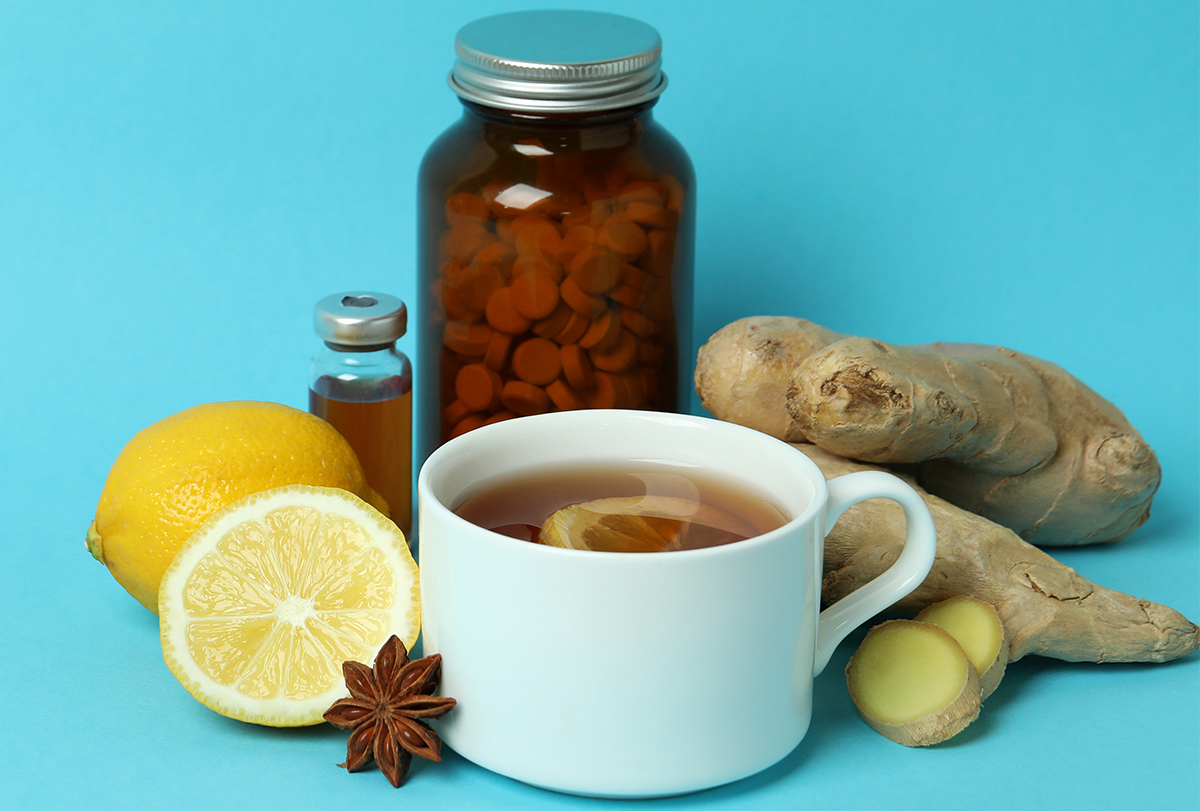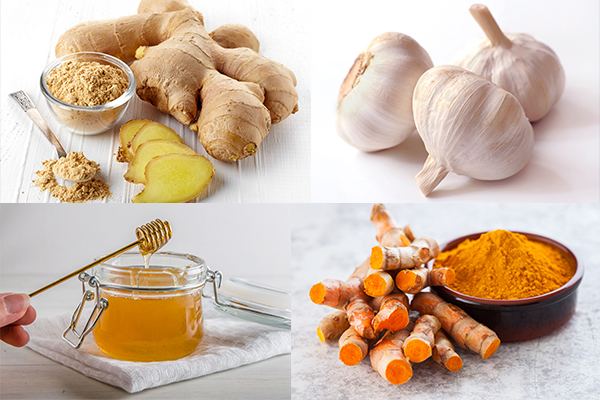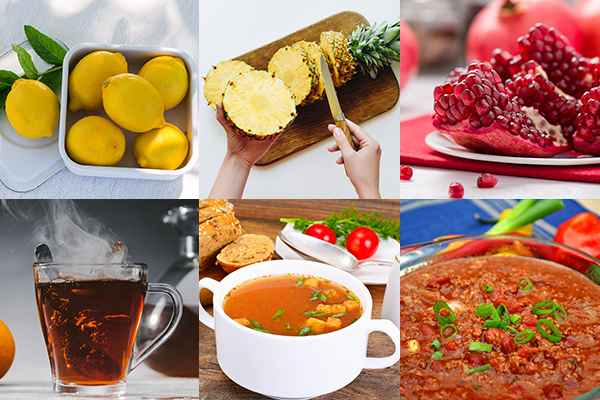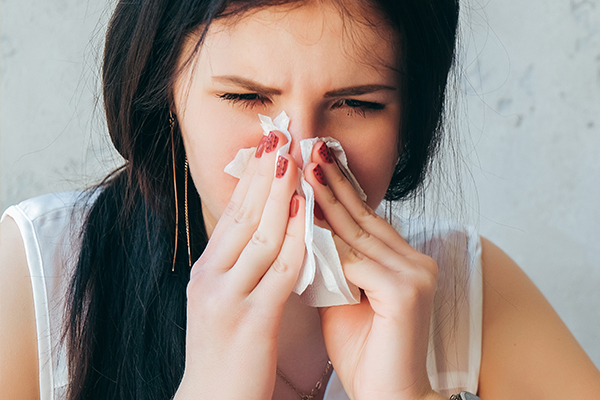In this article:
Everybody has had a case of the sniffles in the winter. While colds are more common in the winter, you can get them any time of year.

This article will discuss some common causes of common cold and cough, foods to eat to help you recover, and some diet tips to keep in mind over the winter.
What Are the Best Foods to Eat When Having Cough and Colds?
Here are foods that can help you prevent and recover from cough and colds.
1. Ginger
In addition to reducing inflammation, being an antioxidant, and helping with nausea, fresh ginger, in particular, has an antiviral effect on respiratory mucosal cells. (1)
2. Garlic
Garlic has medicinal properties, including the ability to reduce the likelihood of colds and shorten the duration and severity if they do occur. (2)
3. Raw honey
Honey is a very old sore throat remedy and can also function as a cough suppressant by soothing your throat. Raw honey in particular has antiviral properties.
A meta-analysis of randomized controlled trials found that honey is an effective cough reliever in children. (3)

4. Turmeric
Turmeric and its active ingredient curcumin are antioxidants and anti-inflammatory. Viral infections such as the common cold and influenza may cause inflammation in the body, and turmeric consumption may help reduce that to promote recovery. (4)
5. Lemon
Lemons, like other citrus, are a great source of vitamin C, which can help reduce the duration of cold symptoms. (5)
6. Pineapple
Pineapple is another good source of vitamin C, a serving providing 131% of the RDI!
A randomized controlled study found that high intake of canned pineapple reduced the incidence of infection in children and increased immune cell production. (6)
7. Pomegranate juice
Pomegranate juice provides 40% of the RDA of vitamin C. In addition, it has shown an antiviral effect in lab tests and is currently being studied for its effect on the common cold. (7)
8. Hot tea
Warm liquids that are caffeine-free can break up congestion in your chest. It is best to choose an herbal tea, (8) and feel free to add honey or lemon to it!
Black teas are full of caffeine, a known diuretic that causes excessive urination that can dehydrate the body. Dehydration will worsen the illness and prolong recovery. So try to limit the consumption of caffeinated beverages when reeling with a cold or flu.
9. Broth or soups
Broth and soups can clear up congestion in the same way hot tea can. In addition, broth is hydrating and contains electrolytes in the form of salt, which are needed to help you recover. (9)

10. Spicy foods
Spicy foods can make your nose run and clear out your sinuses, just what you need with a cold! In early studies, capsaicin, a substance in chili peppers, has shown benefits in treating rhinitis, although more information and studies are needed. (10)
What Are the Causes and Symptoms of Cough and Colds?
Most commonly, the symptoms of a cold, such as runny nose, sneezing, body aches, headaches, and coughing, are caused by a class of viruses called the rhinovirus. (11)
A cough is caused by an irritant and can be anything, from cleaning chemicals to dust. Symptoms vary depending on what the cause is.
If the cause is an allergy, for example, postnasal drip might be a symptom. Shortness of breath or tightness in the chest can also occur.
What Is a Cough?
A cough by definition is a forceful expulsion of air from the lungs in response to a signal from the brain to rid the body of an irritant in the lung or airway. (12)
The irritant can be external, such as dust, or internal, such as a virus or airway inflammation, like in asthma.
How Common Are Cough and Colds During Winter?

Cough and colds are very common. Adults on average have 2–4 colds a year and kids have 6 or more. (13) Overall, 1 billion people experience colds and/or cough every year. (14) Colds tend to increase in the winter due to indoor close contact.
Do Antibiotics Work Against the Common Cold?
A cold is a viral infection in your nose or throat. A virus is not the same as bacteria. Antibiotics work against bacterial infections but are ineffective when it comes to fighting viral infections such as the common cold. (15)
Should I Change My Diet for the Winter Months?
A recent essay in a metabolic journal explores the fact that, in the winter, the body needs more energy simply because the energy required to stay warm increases the resting metabolic rate, the number of calories needed to function every day. This article, however, notes that the body is able to use that additional need from fat stores, and it does not have to come from extra calories per day. (16)
Because you are more susceptible to coughs and colds over the winter, due to being inside and in contact with others, a healthy, balanced diet is important.
Including the foods discussed above will help you stay healthy, not just during a cold but all year round! But a bonus perk of having them during the colder months is that they help your body stay warm.
Most-Asked Questions About Cough and Colds
Is vitamin C helpful when suffering from cough and colds?

Vitamin C has long been promoted to help fight colds. However, it does not help prevent colds, several long-term studies have shown.
In 29 recent studies, up to 11,000 children and adults took 1,000 mg of vitamin C, the amount researchers have found acceptable for daily use, for up to several years. Since a cold is caused by a virus, the vitamin cannot prevent it. (17)
What it was shown to do was slightly reduce the duration of symptoms, if it was taken regularly. It showed no effect if a person started it after they already had a cold.
What foods should be avoided during cough and colds?
With a cold, drinking lots of fluids will help. Don’t drink alcohol or caffeine; they can dry you out instead of hydrating you.
Because you are fighting a virus, as much as you can, avoid sugary, fatty, or salty foods. These can inflame your immune system further and make you work harder to recover. (18)
Do different types of cough require different diet plans?
The short answer is yes. It depends on what is causing the cough. Coughs can be chronic, such as those seen in asthma and chronic pulmonary diseases, such as COPD.
For a normal, occasional cough, no diet changes are needed as it is simply a response to an occasional irritant. If the cough is caused by asthma, the diet plan will need to consider what causes the asthma (i.e., if it is allergy related) or foods that reduce inflammation.
COPD is a much more complicated disease and calorie needs increase because of the work of breathing; thus, you have to make sure you eat enough. In both cases, omega-3s and omega-6s have had a positive effect on treatment.
For a cough caused by the cold, eating the foods listed above should be the only diet adjustment needed.
What foods help in reducing mucus?
In addition to those already listed, fatty fish and olive oil can help reduce mucus.
What foods should be avoided altogether during the winter months?
Cold foods, it is said, should be avoided in the winter. This may be more of a matter of personal preference.
Additionally, some sources say meat, dairy, sugary, or spicy foods should be avoided. However, these come from eastern systems that utilize a hot/cold method of foods.
A healthy, balanced diet is important at all times of the year, and cutting out any foods should be done under the supervision of a doctor or dietitian if they feel it benefits you based on your health condition.

Final Word
The foods you eat nourish your body so that it can stay active, grow, heal, and fight off diseases. Needless to say, diet plays an important role in helping your body recover from the common cold, flu, and other such infections. (15)
Not just that, eating healthily can even help you escape these infections altogether. However, all foods are not created equal when it comes to nutritional value and immunity-boosting capabilities.
The goal is to consume an overall healthy and well-balanced diet, including the immunity-boosting foods already listed here, throughout the year but especially during winters when the common cold and flu are on the rise.
- Was this article helpful?
- YES, THANKS!NOT REALLY


